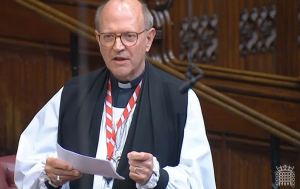On 4th March 2024, the House of Lords debated the Safety of Rwanda (Asylum and Immigration) Bill in the first day of the report stage. The Bishop of St Edmundsbury & Ipswich spoke in the debate, supporting amendments on assessing Rwanda’s safety, establishing right of return for asylum seekers after relocation, and protection for victims of modern slavery:
The Lord Bishop of St Edmundsbury & Ipswich: My Lords, I shall speak in favour of Amendments 1, 3 and 5 tabled by the noble Baroness, Lady Chakrabarti, to which I have added my name. I do not believe that we can enshrine in law a statement of fact without seeing and understanding the evidence that shows such a statement to be true, in particular when such a statement of fact is so contentious and for which the evidence may change. Ignoring for a second the strange absurdity of such declarations, we must also consider the real impact that this could have on the potentially vulnerable people whom the Government intend to send to Rwanda. As my most reverend friend the Archbishop of Canterbury, who is in his place, said at Second Reading,
“in almost every tradition of global faith and humanism around the world, the dignity of the individual is at the heart of what is believed”.—[Official Report, 29/1/24, col. 1014.]
Sending those who seek refuge in the UK to a country of questionable safety does not respect this dignity, so I support amendments that require further evidence of the safety of Rwanda before anyone is sent there.
The Lord Bishop of St Edmundsbury & Ipswich: Noble Lords would expect the Bishop of St Edmundsbury and Ipswich to support the noble Lord, Lord Anderson of Ipswich, which I will do, but I want to say a few words about Amendment 39, which the noble Lord, Lord Blunkett, tabled and to which is added my name and that of my right reverend friend the Bishop of Bristol. It simply asks that the right be given to those who have gone to Rwanda and been granted refugee status to be able to return in some circumstances, because it may well be that Rwanda is not a country where they should remain. Noble Lords can imagine issues around language, the possibility of destitution, risks to victims of modern slavery—various circumstances. Not allowing those granted refugee status to return to the UK seems a failure in the Bill.
This is not unprecedented. Indeed, the arrangements currently being made between Albania and Italy mean that those processed in Albania can, if they choose to do so, return to Italy. I urge that this amendment be considered as a way of making that option available.
The Lord Bishop of St Edmundsbury & Ipswich: My Lords, I support Amendment 42 tabled by the noble and learned Baroness, Lady Butler-Sloss. My right reverend friend the Bishop of Bristol regrets that she cannot be in her place today to speak in support of this amendment, which she has signed.
The question of deterrence is central to the Government’s premise in the Bill. The threat of being removed to Rwanda should, in theory, be sufficient to discourage asylum seekers from taking dangerous crossings in small boats across the channel. Even if we accept that this will work for individuals trafficked to the UK against their will—I have not seen evidence that suggests it will—how can the Bill possibly have a deterrent effect? This point was made repeatedly in Committee, but it has not been adequately addressed.
There are as many as 4,000 people in the national referral mechanism who could potentially be eligible for removal. Can we not give them assurance that we will not subject them to further upheaval? The Global Slavery Index estimates that the rate of modern slavery in Rwanda is more than twice as high as the rate in the UK. Can we be sure that victims will be safe from the risk of re-trafficking?‘
The provisions of the Bill are incompatible with protective obligations, but potential victims will not even be able to put this injustice to the courts under the Rwanda treaty. Not identifying victims or sending them to another country before their claim has been properly assessed will also set us back in our efforts to bring perpetrators of modern slavery to justice. Victims are often the only witnesses of this crime; without them, the case against perpetrators will be significantly harder to make. Safeguarding victims of modern slavery from removal to Rwanda will have a negligible impact on the supposed deterrent effect of the Bill, and every effect on the safety and flourishing of the victims of modern slavery.


You must be logged in to post a comment.